Peace and Conflict Studies
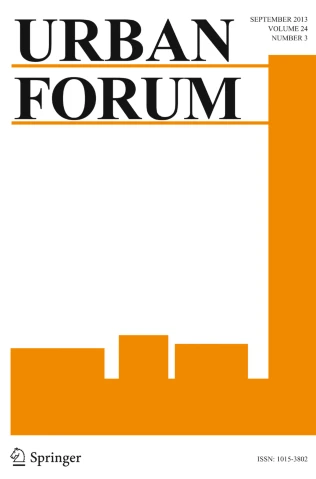
Armed Conflict and Urbanization in Cabo Delgado, Mozambique: A methodology for a critical inquiry
Abstract:
Mainstream urban theory fails to encompass urbanization in Africa. Among its many drivers, armed conflicts displace rural populations to cities, accelerating urban processes and impacting sustainability and governance — the phenomenon of conflict-induced urbanization. In the province of Cabo Delgado, a violent insurgency has been displacing thousands of civilians since 2017; many of whom have fled to the provincial capital Pemba, doubling its population in just 5 years. This article presents the theoretical framework and methodological design for an inquiry located within a contemporary critique of mainstream urban studies; the goal is to analyse conflict-induced urbanization in Pemba with a comparative case study, using participatory visual methods, for which a pilot study took place in September 2022. With this, the author aims to contribute to engaged urban studies in Mozambique and Portugal and to transform the trauma of war into opportunities for sustainable development and prosperity.
Cite this article:
Agostinho do Amaral, S. Armed Conflict and Urbanization in Cabo Delgado, Mozambique: A Methodology for a Critical Inquiry. Urban Forum (2023). https://doi.org/10.1007/s12132-023-09505-y
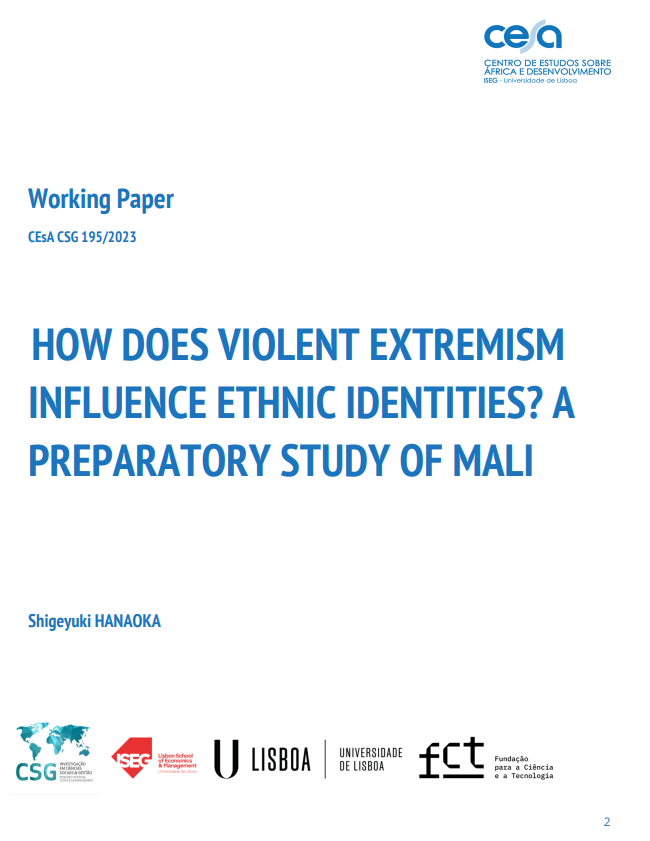
Working Paper 195/2023: How Does Violent Extremism Influence Ethnic Identities? A Preparatory Study Of Mali
Abstract:
How does violent extremism (VE) impact individuals’ ethnic identities? While there is a broad body of research on VE, which has seen significant growth in Africa in recent years, including assessments of its origins, the coalescence of various movements, and military operations against VE, research on its impact on ethnic identity and its associated political behaviours remains limited. This work serves as a preparatory study to examine how people’s perceptions, and political behaviours related to ethnic identity have evolved during the period of VE’s substantial expansion in Mali in recent years.
Quotation:
Hanaoka, Shigeyuki (2023). “How Does Violent Extremism Influence Ethnic Identities? A Preparatory Study Of Mali”. CEsA/CGS – Documentos de trabalho nº 195/2023
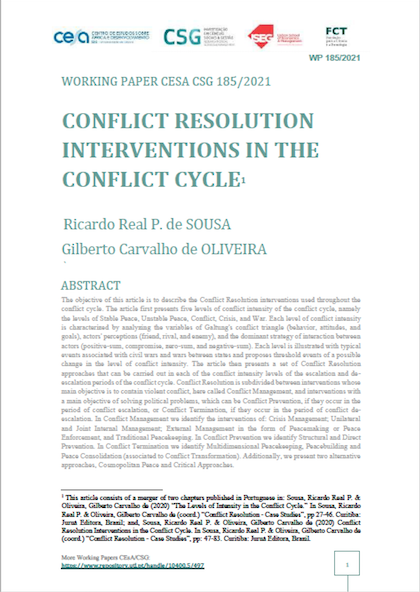
Working Paper 185/2021: Conflict Resolution Interventions in the Conflict Cycle
Abstract:
The objective of this article is to describe the Conflict Resolution interventions used throughout the conflict cycle. The article first presents five levels of conflict intensity of the conflict cycle, namely the levels of Stable Peace, Unstable Peace, Conflict, Crisis, and War. Each level of conflict intensity is characterized by analyzing the variables of Galtung’s conflict triangle (behavior, attitudes, and goals), actors’ perceptions (friend, rival, and enemy), and the dominant strategy of interaction between actors (positive-sum, compromise, zero-sum, and negative-sum). Each level is illustrated with typical events associated with civil wars and wars between states and proposes threshold events of a possible change in the level of conflict intensity. The article then presents a set of Conflict Resolution approaches that can be carried out in each of the conflict intensity levels of the escalation and de escalation periods of the conflict cycle. Conflict Resolution is subdivided between interventions whose main objective is to contain violent conflict, here called Conflict Management, and interventions with a main objective of solving political problems, which can be Conflict Prevention, if they occur in the period of conflict escalation, or Conflict Termination, if they occur in the period of conflict de escalation. In Conflict Management we identify the interventions of: Crisis Management; Unilateral and Joint Internal Management; External Management in the form of Peacemaking or Peace Enforcement, and Traditional Peacekeeping. In Conflict Prevention we identify Structural and Direct Prevention. In Conflict Termination we identify Multidimensional Peacekeeping, Peacebuilding and Peace Consolidation (associated to Conflict Transformation). Additionally, we present two alternative approaches, Cosmopolitan Peace and Critical Approaches.
Quotation:
Sousa, Ricardo Real P. de e Gilberto Carvalho de Oliveira (2021). “Conflict resolution interventions in the conflict cycle”. Instituto Superior de Economia e Gestão – CEsA/ CSG Documentos de Trabalho nº 185/2021.
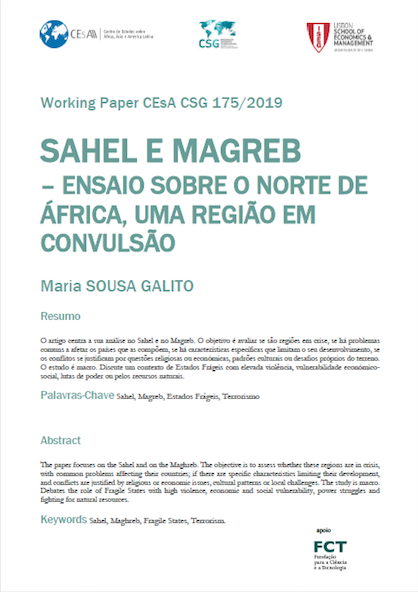
Working Paper 175/2019: Sahel e Magreb: Ensaio sobre o Norte de África, uma região em convulsão
Abstract:
Sahel e Magreb : ensaio sobre o norte de África, uma região em convulsão focuses on the Sahel and on the Maghreb. The objective is to assess whether these regions are in crisis, with common problems affecting their countries; if there are specific characteristics limiting their development, and conflicts are justified by religious or economic issues, cultural patterns or local challenges. The study is macro. Debates the role of Fragile States with high violence, economic and social vulnerability, power struggles and fighting for natural resources. The paper is subdivided into two chapters. The first compares the Sahel and Maghreb regions, with a short analysis for each country that constitutes them, since the spaces are very related to each other, since traffickers transit along the trade routes of the ancient caravans of the desert caravans, or less watched over by law enforcement agents or controlled by guerrillas or or controlled by guerrilla or terrorist groups. Maps and statistical tables are offered for appropriate comparisons. The second chapter is about the influence of the Arab Spring in North Africa, with reference its main causes and consequences. Given that these states are considered fragile by the international community, the question is whether they are failures and why they have serious problems of governance, internal stability or the stability of their borders. It assesses the fight against terrorism, in a sensitive in a sensitive context where former guerrilla fighters are still active, part of militias or terrorist groups or claiming possession of natural resources, reclaiming for themselves the sources of income and the channels of distribution. sources of income and channels of distribution. Different types of violence or organised crime are also differentiated crimes.
Quotation:
Galito, Maria Sousa (2019). “Sahel e Magreb : ensaio sobre o norte de África, uma região em convulsão”. Instituto Superior de Economia e Gestão – CEsA/ CSG – Documentos de Trabalho nº 175/2019.
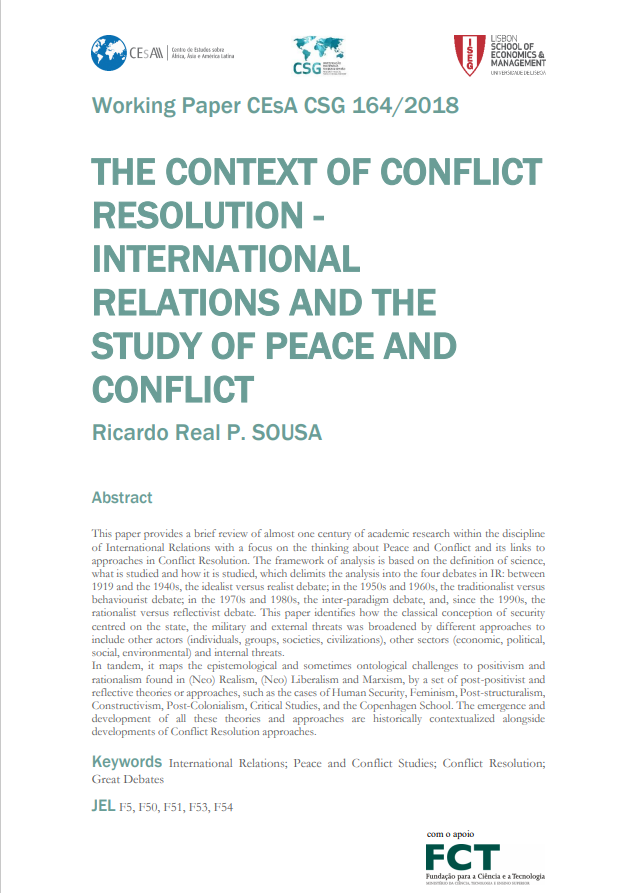
Working Paper 164/2018: The Context of Conflict Resolution: International relations and the study of peace and conflict
Abstract:
The Context of Conflict Resolution: International relations and the study of peace and conflict provides a brief review of almost one century of academic research within the discipline of International Relations with a focus on the thinking about Peace and Conflict and its links to approaches in Conflict Resolution. The framework of analysis is based on the definition of science, what is studied and how it is studied, which delimits the analysis into the four debates in IR: between 1919 and the 1940s, the idealist versus realist debate; in the 1950s and 1960s, the traditionalist versus behaviourist debate; in the 1970s and 1980s, the inter-paradigm debate, and, since the 1990s, the rationalist versus reflectivist debate. This paper identifies how the classical conception of security centred on the state, the military and external threats was broadened by different approaches to include other actors (individuals, groups, societies, civilizations), other sectors (economic, political, social, environmental) and internal threats. In tandem, it maps the epistemological and sometimes ontological challenges to positivism and rationalism found in (Neo) Realism, (Neo) Liberalism and Marxism, by a set of post-positivist and reflective theories or approaches, such as the cases of Human Security, Feminism, Post-structuralism, Constructivism, Post-Colonialism, Critical Studies, and the Copenhagen School. The emergence and development of all these theories and approaches are historically contextualized alongside developments of Conflict Resolution approaches.
Quotation:
Sousa, Ricardo Real P. (2018). “The Context of Conflict Resolution: International relations and the study of peace and conflict”. Instituto Superior de Economia e Gestão – CEsA/ CSG Documentos de Trabalho nº 164/2018.





